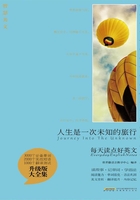
你才是行为和态度的主宰者 Do You Act—Or React
佚名/Anonymous
I walked with my friend to the newsstand the other night, and he bought a paper, thanking the newspaper seller politely. The vendor didn't even acknowledge it.
"A sullen fellow, isn't he?" I commented.
"Oh, he's that way every night," shrugged my friend.
"Then why do you continue to be so polite to him?" I asked.
"Why not?" inquired my friend. "Why should I let him decide how I'm going to act?"
As I thought about this incident later, it occurred to me that the important word was "act". My friend acts toward people; most of us react toward them.
He has a sense of inner balance which is lacking in most of us; he knows who he is, what he stands for, how he should behave. He refuses to return incivility from incivility, because then he would no longer be in command of his own conduct.
When we are enjoined in the Bible to return good for evil, we look upon this as a moral injunction—which it is. But it is also a psychological prescription for our emotional health.
Nobody is unhappier than the perpetual reactor. His center of emotional gravity is not rooted within himself, where it belongs, but in the world outside him. His spiritual temperature is always being raised or lowered by the social climate around him, and he is a mere creature at the mercy of these elements.
Praise gives him a feeling of euphoria, which is false, because it does not last and it does not come from self approval. Criticism depresses him more than it should, because it confirms his own secretly shaky opinion of himself. Snubs hurt him, and the merest suspicion of unpopularity in any quarter rouses him to bitterness.
A serenity of spirit cannot be achieved until we become the masters of our own actions and attitudes. To let another determine whether we shall be rude or gracious, elated or depressed, is to relinquish control over our own personalities, which is ultimately all we possess. The only true possession is self-possession.
前两天晚上,我和朋友散步,走到一个书报摊前,朋友买了一份报纸,很礼貌地跟那位报贩道谢,而那报贩却置若罔闻。
“他可真是个沉闷的家伙,不是吗?”我批评道。
“噢,他每个晚上都这样。”朋友耸耸肩说。
“那你为什么还对他这么有礼貌呢?”我问道。
“为什么不呢?”朋友反问道,“我怎么做,为什么要让他决定呢?”
后来,我反复思索这件小事,发现最重要的字眼是“主动去做”。朋友的举动是主动待人,而我们大多数都是被动地回应。
他拥有内心的平衡感,而我们大多数人却很缺乏;他了解自我,明确自己的立场,通晓处世之道。他拒绝以怨抱怨,那样他将不再是自己行为的主宰。
当我们遵奉《圣经》以德报怨的训诫时,视其为一种道德规范——它的确如此。但同时,它也是精神健康的一剂良药。
一味被动回应的人最不容易快乐。他情感的重心随外界转移,而非根植于自己的内心世界;他的情绪随周围的社会风尚变迁,他成了受这些因素摆布的可怜虫。
称赞并不能给他带来真正的快乐,因为,它不会持久,而且并非来自自我认可;批评会使他过度悲伤,因为他内心深处的不自信再一次得到确认;冷落会使他伤痛,他也会因某处哪怕一点点的怠慢而痛苦不堪。
要做到平心静气,我们就要主宰自己的行为和态度。如果我们的举止是粗鲁或优雅、是欢欣或沮丧,要由他人来决定的话,就是放弃对自我的主宰,而这是我们真正拥有的东西。我们唯一真正拥有的就是自我控制。
Better to light one candle than to curse the darkness.
—Strong
与其诅咒黑暗,不如燃起蜡烛。
——斯特朗
inquire[inˈkwaiə]v.询问;问明;查究
He asked me to inquire after you.
他要我问候你。
euphoria[ju:ˈfɔ:riə]n.幸福愉快感
It was more about the euphoria, the joy.
相反,我感受更多的是陶醉和快感。
gracious[ˈgreiʃəs]adj.亲切的;高尚的
I received a gracious letter of acknowledgement.
我收到一封有礼貌的感谢信。
relinquish[riˈliŋkwiʃ]v.放弃;放手;让出
Finally he relinquish his plan for want of business.
因生意需要,彼得只好放弃计划。
一味被动回应的人最不容易快乐。
__________________________________________
要做到平心静气,我们就要主宰自己的行为和态度。
__________________________________________
我们唯一真正拥有的就是自我控制。
__________________________________________
As I thought about this incident later, it occurred to me that the important word was "act".
occur to:想起
__________________________________________
He has a sense of inner balance which is lacking in most of us; he knows who he is, what he stands for, how he should behave.
stand for:代表
__________________________________________